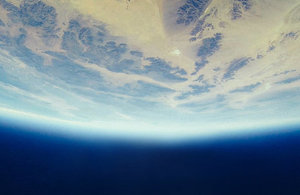GLD lawyer helps seal "monumental" deal to cut greenhouse gases
GLD lawyer Brian Ruddie led an international group of lawyers to secure an important deal to protect the environment.

View of Earth from space
GLD lawyer Brian Ruddie led an international group of lawyers to help secure a global deal which will limit the use of hydrofluorocarbons (HFCs). HFCs are a major contributor to greenhouse gases and the deal will be a significant step forward in the battle against climate change.
The Kigali Amendment updates the 1987 Montreal Protocol and is expected to reduce carbon dioxide in the atmosphere by 70 billion tons and prevent up to 0.5 degrees Celsius of global warming by the end of the century. The Kigali Amendment was finally agreed at 7am on the final day following tense overnight negotiations.
The legal team
Brian Ruddie, together with lawyers from other delegations, was responsible for drafting the required treaty text, and, in doing so, ensuring the successful collaboration of delegates from nearly 200 countries.
Brian Ruddie said:
Negotiations have been ongoing for 7 years, however, it was almost at the last possible moment that agreement on the issues was reached and we were given something to work with – on this occasion it was a list of numerical variables that we had to change into legal text.
As the chair, I was responsible for co-ordinating the legal group’s work, making sure that the text covered all the agreed points, was presented in the correct format and for answering questions from delegates from the floor of the meeting.
The Montreal Protocol (1987)
The Montreal Protocol is an international treaty to protect the ozone layer by phasing out the production of harmful substances such as chlorofluorocarbons (CFCs), which were used in fridges, air conditioners and aerosols.
The latest challenge is the growing use of HFCs which are mainly used in fridges and air conditioners. Although HFCs are not like CFCs and so directly harmful to the ozone layer, HFCs are greenhouse gases. The phasing out of HFCs has been controversial; some countries argued that HFCs are not ozone-depleting substances so should not be included in the Protocol whilst others argued that the long-term issues meant that HFCs should be phased out in the same way as CFCs.
The resulting agreement, the “Kigali Amendment”, will see the phased reduction in HFCs, with richer economies including the EU and US required to make a cut of at least 10% by 2019.
US President Barack Obama praised the deal, saying:
Together, these steps show that, while diplomacy is never easy, we can work together to leave our children a planet that is safer, more prosperous, more secure, and more free than the one that was left for us.